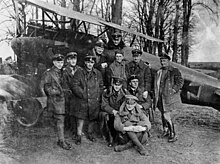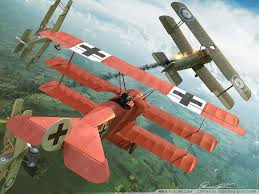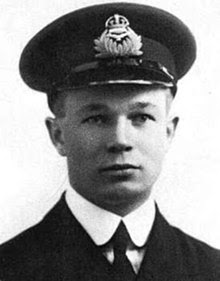4/21/1918 - One of the great combat fliers of all-time has his luck finally run out on this day in 1918 over northern France, near the Somme River, and all of Germany weeps when its citizens learn of the death of The Red Baron, 25-year-old Manfred Albrecht Freiherr von Richthofen.
 Richtofen Wearing His Blue Max
Richtofen Wearing His Blue Max
Born to an aristocratic Prussia family living in what today is Poland on 5/2/1892, Richthofen grows up loving to ride horses and hunt (deer, boar, elk, and birds), and develops excellent gymnastic skills (winning several awards for his abilities on the parallel bars) ... physical attributes that will serve the future ace well in the coming dogfights of WWI. At 11 he begins military training to become a cavalry officer in the German Army.
When world war breaks out in 1914, Richthofen is a cavalry reconnaissance officer who sees action in Russia, Belgium, and France ... but machine guns and trench warfare soon become the bane of horseback fighters, and when Richthofen is transferred to the army's supply branch he balks and requests a transfer ("I have not gone to war in order to collect cheese and eggs ...") to the Luftsitkraftetre (the Imperial German Air Service) to become a fighter pilot.
 Family Coat-of-Arms
Family Coat-of-Arms
Training first as an observer (he shoots down his first fighter over France, but is not given credit for the kill when the Farman aircraft falls behind enemy lines), then as a pilot. HIs career take off (pun indeed intended!) in September of 1916, when German ace Oswald Boelcke (known as the "Father of Air Fighting Tactics") selects the young flier to become a member of his squadron, Jagdstaffel 2.
 Boelcke and Blue Max
Boelcke and Blue Max
Richthofen's first aerial victory comes on 9/17/1916 ... an event that the flier celebrates by ordering a small silver commemoration cup with the date and type of aircraft down, establishing a tradition for his triumphs that lasts until Germany runs low on precious ores as the ace reaches victory #60! Following the lessons of Boelcke (who dies in a mid-air collision in 1916), Richthofen soon becomes famous to both sides in the war for his mounting victory totals and his approach to air combat ... don't do anything stupid and attack from above and out of the sun with wingmen watching your tail. The Red Baron (his planes are always painted red), his most famous victory comes against British ace (22 victories before his fall) and Victoria Cross winner, Major Lanoe Hawker, in an epic dogfight over Achiet-le-Grand, France. Hawker does not survive the encounter!
 Hawker
Hawker The Trophy Room
The Trophy Room Richthofen (the pilot) and members of Jasta 11
Richthofen (the pilot) and members of Jasta 11
Richthofen's first brush with his own death comes on 7/6/1917 when the ace tangles with a group of two-seat British fighters ... hit in the head by a bullet, the ace regains consciousness in time to pull his plane out of free-falling spin and land in a field behind German lines. Rushed to a hospital, Richthofen will endure multiple surgical operations to remove bone splinters from the site of the bullet's impact (he will suffer post-flight nausea and headaches from the wound until his death). Refusing to take the desk job his combat victories have earned, in October of 1917 the flier returns to active service and runs his confirmed aerial victory total to 80.
 Combat
Combat Recovering
Recovering Combat
Combat
On his last day of life, in his red Fokker Dr.I triplane, struggling with a jammed machine gun (and another that can only fire short bursts before requiring recocking), Richthofen is in the midst of a low level pursuit of a novice Canadian pilot, Lt. Wilfrid "Wop" May, when death finally finds him as the wind drifts of the late morning take him over enemy lines. For years, credit for the kill has gone to Canadian Captain Arthur "Roy" Brown who fires on Richthofen while he is chasing after May, but has to pull away and turn steeply to avoid impacting with the ground. What most historians now believed happened was that Richthofen was brought down by a bullet fired from the anti-aircraft Lewis machine gun of Australian Sgt. Cedric Popkin, who fires on Richthofen twice while the flier is in pursuit of May (credence for this theory comes from the angle of the wound that kills Richthofen, and the fact that the Red Baron continues his pursuit a full two minutes after Brown has vacated the scene, an impossibility given the nature of the wound Richthofen receives).
 May
May Brown
Brown
24th Machine Gun Company
Popkin is second from right in middle row
Whatever takes place, Richthofen is hit by a single .303 bullet that penetrates his body from his right armpit and comes out near his left nipple, causing massive fatal heart and lung damage ... damage that the Red Baron fights off just long enough to make a controlled landing in a field just north of the village of Vaux-sur-Somme. Australian gunner Ernest W. Twycross is the first man to reach the plane ... and in his tale, Richthoven tries to say something in German, sighs, and then dies, while another witness, Sgt. Ted Smout of the Australian Medical Corps states that Richthofen's last word is "Kaputt!" Dead and taken to the nearby village of Bertangles for burial, the legendary red triplane is soon torn apart and becomes hundreds of souvenirs for the Australian soldiers manning the sector.
 Souvenirs
Souvenirs Richthofen in Death
Richthofen in Death Burial
Burial
25-year-old Baron Manfred von Richthofen, the top ace of WWI, is no more ... 4/21/1918!
 Richthofen
Richthofen Hunting
Hunting
No comments:
Post a Comment